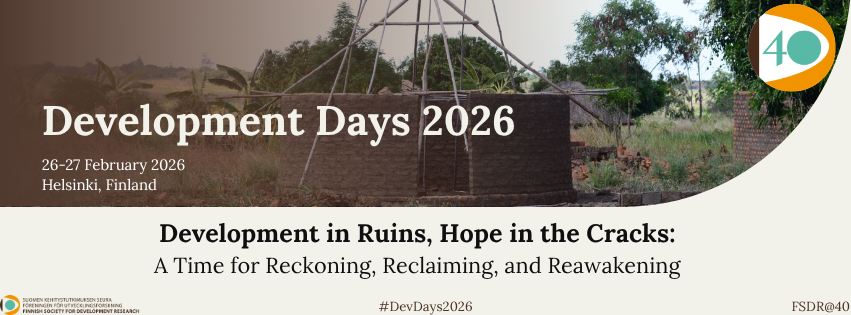Working Group Coordinators: Dr. Crystal Green and Dr. Susan Wiksten, University of Helsinki
Title: Shifting Foundations for Civic Space and Expanding Solidarity: Learning, Care, and
Collective Agency Beyond Development
Theme: Reclaiming the Cracks – Sites of Hope, Resistance, and Alternatives
Across the world, civil-society actors in development and humanitarian fields are confronting a difficult and uncertain moment. The post-war system of aid and international cooperation,
founded on liberal ideals of progress and partnership, is disintegrating amid austerity, donor
retreat, rising militarization, and the expanding financialization of development. Within this
landscape of contraction, new solidarities may form as educators, health workers, farmers,
researchers, and community organizers seek to reclaim their work as a civic and relational
practice. Grounded in post-development and critical perspectives, this working group explores
how actors operating between state and market sustain spaces of meaning, care, and collective agency amid the “end of the age of NGOs.”
We welcome perspectives that extend classical and postcolonial understandings of solidarity.
Drawing on Durkheim’s attention to the interaction of societal change and norms (Durkheim,
1919), for understanding what is understood as ethically grounded interventions amidst societal change and Chatterjee’s (2004) reflections on the coexistence of formal civil society and informal political society, the group also invites dialogue informed by feminist, decolonial, and other critical traditions on how collective life endures and transforms when regimes of governance change and official systems falter.
We invite submissions exploring how civil-society organizations, movements, and hybrid networks navigate shrinking political and financial space and redefine their roles within it. What forms of mutual aid, reciprocity, or collective organizing are emerging across different contexts? What pedagogical, communicative, or relational practices help rebuild trust and belonging when formal systems retreat? What strategic silences, compromises, or acts of imagination sustain hope and cooperation amid the erosion of institutional security?
This session aims to open a space for shared inquiry into how civil society nurtures solidarity and world-making amid systemic change.
We welcome proposals for individual papers (maximum 300 words) to be submitted by email to crystalbgreen@gmail.com or susanwiksten@g.ucla.edu. The Working Group will feature paper presentations followed by collective discussion, offering an opportunity for participants to exchange ideas and develop shared perspectives on the theme. The session will be conducted in a hybrid format, allowing for both in-person and online participation. The submission of full papers will not be required for this working group. For inquiries or further information about the session, please contact either of the organizers at the addresses above.
References:
Durkheim, É. (1919). Les Règles de la méthode sociologique. Librarie Félix Alcan.
Chatterjee, P. (2004). The politics of the governed: Reflections on popular politics in most of the world. Columbia University Press.
